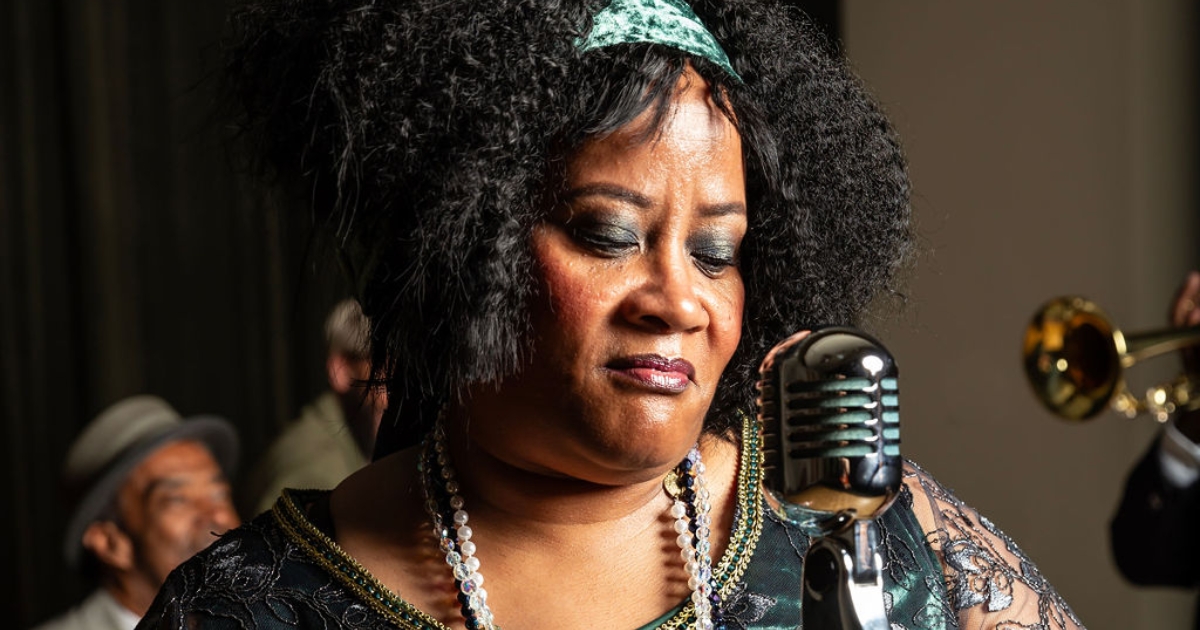It all starts out quietly enough, with a group of musicians killing time before the arrival of Ma Rainey, their singer. They joke a little; they bicker. Levee (Noah King-Bates), the trumpet player, peacocks in a beautiful pair of brand-new shoes. The kid’s got ambition; he’s determined to start his own band—and determined that the one he’s stuck in now is going to play his arrangement of the titular song. You might laugh him off until you remember that levees sometimes break.
Ma Rainey’s Black Bottom (onstage at Circle Theatre through August 26th) is part of August Wilson’s Century Cycle. In 10 plays and over 10 decades, the cycle tells specific but representative stories of African-American life. It’s a major work of American theater. While Ma Rainey’s Black Bottom is set in the 1920s, it speaks to trauma and injustice whose gravity still tugs at our waves today.
The musicians talk with the familiarity and irritation of people who’ve spent too much time together. Cutler (Michael P. Travis), the drummer, just wants to get on with the work. Travis invests him with a weary dignity. Toledo (Debra Perry), the reader of the group, can’t help but peek from behind his newspaper to shake his head at the fools he has to work with. But it’s Levee we watch most carefully, sensing barely contained emotions.
Ma still hasn’t shown up, and time is money. Irvin (Michael Stoddard) does his best to calm Sturdyvant (Richard Mulligan); Sturdyvant’s title is never mentioned, but it appears clear that he’s the head of the record label. It’s a label for which Ma Rainey has made more money than all its other artists combined, not that would help her get a cab if she needed one; she’s colored, to use the parlance of the times, and colored people were the ones who made her wealthy.
She finally arrives. As Rainey, Casaundra Ce’Moune is what could be dismissed as a diva: a woman who knows her worth and who has to insist on that worth because others keep failing to recognize it. (Buy me a drink and I’ll tell you about the time Aretha Franklin yelled at me). Ce’Moune never places a foot wrong; she is believable throughout, and when she finally gets to sing, it’s a highlight of the show.
She’s brought with her a nephew, Sylvester (Jhaiell Kilgore) and teenage Dussie Mae (Erica Starks). They bring both some comic relief and some mild danger; Sylvester, a stutterer, is supposed to perform a vocal intro on one of the songs, and Dussie Mae, something of a flirt, wanders into Levee’s orbit. But Wilson’s playing for higher stakes.
William Faulkner wrote the following: “The past is never dead. It’s not even past.” Indignities have bruised these people—imaging having to go all over the state to cash a check—and trauma’s done worse than that. In one gutting monologue, we get awful insight into the history of one of our characters and an understanding of what drives him to do what he does.
Wilson was a clear-eyed, wise writer. While his characters may raise their voices, he never did; instead, he composed the music. It may be a century after the events the play depicts, but it sounds like yesterday.
Ma Rainey’s Black Bottom
Grand Rapids Circle Theatre
Aug. 10-26
https://circletheatre.org/production/ma-raineys-black-bottom/





